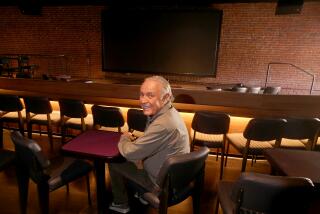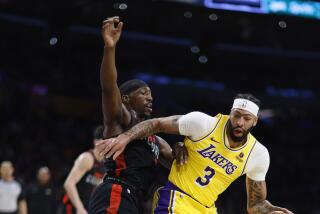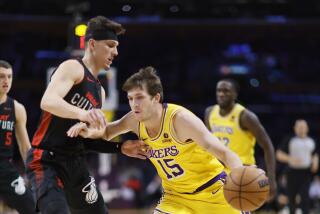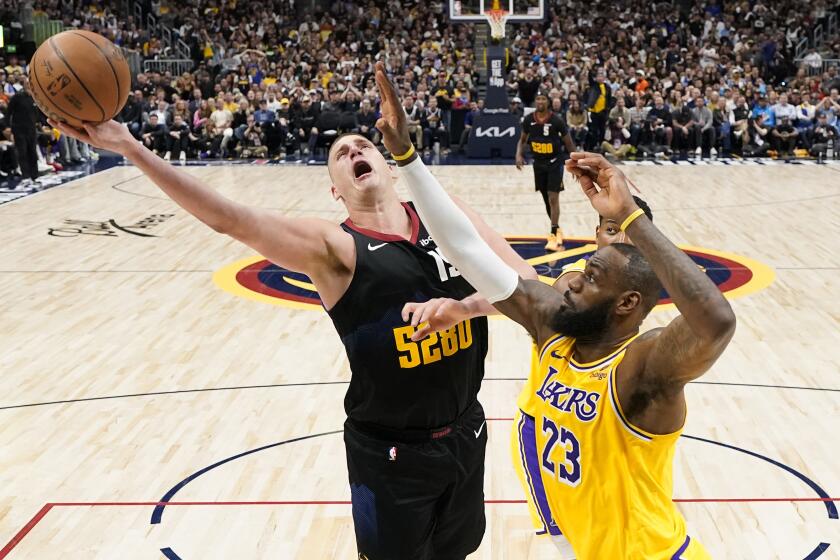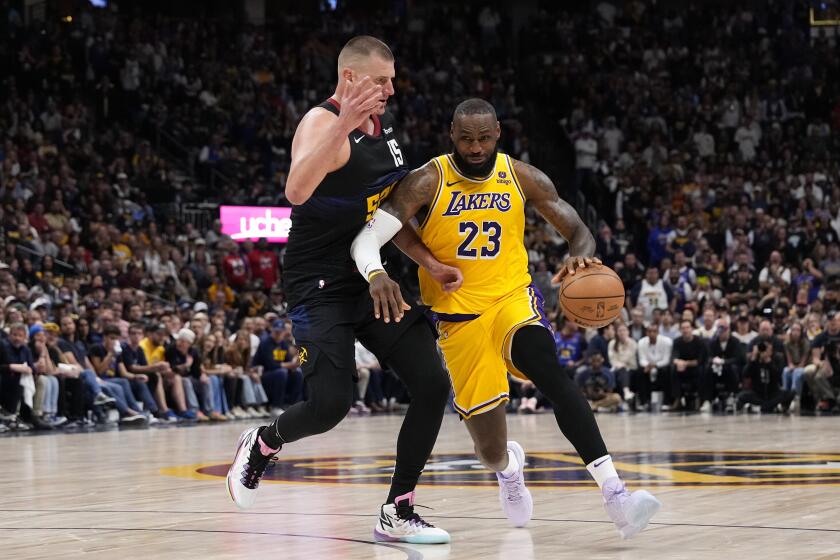Buss family faces crucial moment with the Lakers
The six brothers and sisters, with a gap of 31 years from eldest to youngest, gathered in the winter near the first anniversary of their father’s death to discuss some problems about the family business. It’s also the city’s treasured sports team — the Lakers.
The team was nose-diving in the standings, losing the interest of fans, and grinding toward its worst season since the team moved to Los Angeles in 1960.
So Jeanie Buss posed an elementary question to her siblings: What was going on with the Lakers?
Her older brother Jim Buss, 54, in charge of the Lakers’ basketball operations, spoke up in the boardroom of the team’s El Segundo training facility and pledged to resign in a few years if the suddenly dark fortunes of the franchise weren’t reversed.
“I was laying myself on the line by saying, if this doesn’t work in three to four years, if we’re not back on the top — and the definition of top means contending for the Western Conference, contending for a championship — then I will step down because that means I have failed,” he told The Times about the meeting. “I don’t know if you can fire yourself if you own the team … but what I would say is I’d walk away and you guys figure out who’s going to run basketball operations because I obviously couldn’t do the job.
“There’s no question in my mind we will accomplish success. I’m not worried about putting myself on the line.”
It was an emotional meeting, and the siblings — including Johnny, Janie, Joey and Jesse — agreed that Jim deserved more time on the job.
Their father, Jerry Buss, died in February 2013. He left his six children — each with an equal vote — in charge of a family trust, with a 66% ownership stake in the team. But the results of their first season as co-owners weren’t close to championship caliber.
“We’re watching a very unfortunate thing happen to a beloved team right now,” former Lakers coach Phil Jackson told The Times before taking the job last month as president of the New York Knicks. “Everybody is kind of aghast at it and people that are the best customers that any franchise can possibly hope for are dissatisfied, and rightly so.”
Many family businesses struggle after a patriarch dies. But four of the six Buss children remain active in the Lakers’ operations and the family isn’t facing a financial crisis. Their dad left them a franchise valued at more than $1 billion and another great gift — a 25-year, $5-billion broadcast deal with Time Warner Cable. And they seem committed to keeping the Lakers in the family.
“We’re not selling the team. It’s not what we were raised to do,” Jim said. “My dad groomed us for basically 20 years to do what we’re doing.”
But like many extended families, there are disputes and nuances within the relationships of the Buss clan.
One of the most complicated involves Jackson, who coached the Lakers to five championships, and is the fiance of Jeanie Buss, 52. Her father selected her to be the team governor, the franchise’s highest position, and she was placed in charge of the team’s business operations.
She was clearly upset when the Lakers did not rehire Jackson as coach in November 2012, after Jim abruptly fired Coach Mike Brown five games into the season.
The team talked with Jackson about the job and Jeanie wanted him to return to the sidelines. Jeanie later wrote in her book, “Laker Girl,” that she felt betrayed by the decision to hire Mike D’Antoni, pinning it on her brother Jim, even though their father, from his hospital bed, made the final decision. Jim in turn was upset by Jeanie’s book.
However, with Jackson working for the Knicks, some in the Lakers organization believe his departure might help smooth out past family disputes.
Jim insists he and his sister Jeanie get along fine.
“I hate to burst the bubble of what the perception is. We’ve worked together for many, many, many years,” he said. “With the missing piece of my dad, people think we have lost a connection, but that’s not true. It’s just business as usual.”
Still, interviews with NBA officials, agents, players and current and former team employees suggest that the communication between the Lakers’ business and basketball operations needs some improvement. Kobe Bryant raised the issue last month, saying the Lakers’ future starts with Jim and Jeanie “and how that relationship plays out.”
For her part, Jeanie uses the word “empowering” to describe the current situation with Jim, and Lakers General Manager Mitch Kupchak, trying to fix the basketball side of the franchise.
“Jim has assured me that they have a plan in place, that the team will be better next year and we will be back in contention shortly,” Jeanie said. “He’s very confident in that plan and so I have to believe he knows what he’s doing and what he’s trying to accomplish. We have to be patient and give him that opportunity.”
There’s no doubt, though, who has the final say in the team’s day-to-day operations, according to the family trust set up by their father.
“If Jeanie and I got into a disagreement, Jeanie can overrule my argument,” Jim said. “If she is adamant about the way she wants to do things, all she has to do is say, ‘That’s the way it’s going to be.’ But I don’t anticipate those kind of arguments. We’re two smart people and we respect each other. We’re grown up enough to where we can talk things out.”
One choice Jeanie shaped last November was to sign the team’s aging superstar, Bryant, 35, to a two-year, $48.5-million contract extension.
Jeanie was enamored by the idea of Bryant spending his entire career with the Lakers and pushed for an extension to get him to 20 years with the team. The deal honored Bryant’s long career but also limited the Lakers’ rebuilding possibilities while anchoring them to a suddenly injury-prone player.
Bryant signed his contract while getting ready to return from surgery on his Achilles’ tendon. He played six games in December, then fractured his knee and missed the rest of the season.
The Lakers, hit by numerous injuries, faded to the depths of the NBA’s standings and local TV ratings fell 54% this season. The Lakers also failed to sell out nine home games, breaking a seven-year streak of sellouts.
“I don’t like hearing that this is the worst record the team’s ever had since moving to Los Angeles. Those kind of records are hard to erase,” Jeanie said. “But I listen to the fans and want them to know this isn’t what we stand for. This isn’t what we tolerate.”
The Lakers’ chances for a quick revival on the court seem slim, even though they will get a top-10 pick in the NBA draft in June. They still have Bryant until July 2016 and Steve Nash under contract through next season, two veterans sucking up more than half the Lakers’ precious salary-cap space.
As the team tries to retool its roster, Jim continues to work closely with Kupchak, who sounds out ideas with Buss before they arrive at a decision. Buss and Kupchak were torn on what to do with veteran Pau Gasol as the NBA trade deadline approached in February and the team lagged in the standings.
Buss was fine with trading him, Kupchak wasn’t so sure. In the end, the Lakers were never offered more than a second-round draft pick for the aging star, a pittance in their mind. And they didn’t want to seem like they were dumping Gasol’s $19.3-million salary for nothing.
“Mitch wins a lot more of these battles than people imagine,” said an agent who asked not to be identified because he deals with the Lakers. “They respect his caution.”
Meanwhile, Jackson at best coexisted with Jim Buss during an 11-year coaching run with the Lakers.
“I think Jimmy’s well-meaning and he really wants to do the best job,” Jackson said. “One of the things I think Dr. Buss benefited from was having people like Bill Sharman and Jerry West, people around him who could make organizational decisions. He could then make the choices — ‘We can afford this, we can move in this direction.’ And I don’t know where all those choices are being made right now, as to what direction things are going.”
Jackson, in particular, found fault with giving Nash a three-year, $28-million contract and trading two first-round draft picks to acquire him in 2012 from Phoenix. Nash, 40, appeared in only 15 games this season because of chronic back pain.
“They took a flier on Nash that looked like it was going to be a really good thing,” Jackson said. “Unfortunately, they didn’t check with someone who had done therapy with the guy for the last 10 years, Alex McKechnie.”
McKechnie was a physical therapist with the Lakers whose contract was not renewed in 2011. He now works for the Toronto Raptors and has conducted individual workouts with Nash and other NBA players in past off-seasons.
“They had cut ties with Alex, obviously, but still, Alex would have been a resource,” Jackson said. “Steve has been hampered ever since that time and they kind of built the team around the way Steve plays.”
Although Jeanie and Jim generate the headlines, their four siblings will hold the swing votes in any major decision about the Lakers’ future.
The oldest Buss sibling, Johnny, 57, hasn’t been involved in the sports scene since leaving an executive role in 2006 with the WNBA’s Sparks, who were once owned by his father.
Johnny has a new hobby, racing off-road cars, and while he holds a vice president title with the Lakers, he’s rarely seen around the team’s headquarters. He is thought to be closer to Jim than any other sibling.
Janie (Buss) Drexel, 50, oversees the team’s community relations and charitable arm, in a job that deals with plenty of favor-asking. “Every charity she gives money to, she has to say no to 99,” said a person familiar with her work. “She’s a good politician.”
She is also Jeanie’s staunchest ally among the siblings and has taken a greater interest in the Lakers, recently buying a property near the team’s facility after spending the last several years in Temecula.
The youngest siblings are Joey, 29, and Jesse, 26, who have a different mother than their four siblings.
Joey has served in a series of basketball “internships” and was embraced by Jackson and sat in on coaches’ meetings for an entire Lakers season after graduating from USC in 2006. Joey also spent a season shadowing the team’s business and game-operations departments.
He is currently the CEO of the Lakers’ minor league affiliate, the L.A. D-Fenders, and is seen as a possible successor to Jim if the elder Buss steps down. The family gives Joey high marks because the D-Fenders are losing less money than usual under his direction and because he capably deals with the day-to-day transactions of a fluid minor league roster.
“You could have 10 players on your roster at the beginning of the season and a completely different 10 at the end of the season,” Joey said. “I kind of have to figure out an identity for myself and I think the D-Fenders has helped do that.”
Meanwhile, the youngest sibling, Jesse, was elevated to the Lakers’ director of scouting in 2011, a few months after the team laid off several older scouts.
He installed a policy that three Lakers employees must watch a college prospect, not just two. Jesse works much more with Jim than any other sibling.
“I’m pleasantly surprised at his due diligence, his knowledge of the game and his ability to work with our other scouts and management,” Kupchak said of Jesse. “He understands the nuances of the college game, the NBA game and the difference between the two. I listen very closely to him when he has a report on a game.”
Jesse travels with Kupchak each year to Italy for a scouting combine of European players. He also knows the pressure is on for the franchise to make a smart pick in the June draft.
“Obviously this is the first time in several years that we’ve had our first-round pick and given that it’s going to be a high pick in the draft, it’s extremely vital to the franchise,” Jesse said via email, touching on his growing responsibilities. “I learn new things every day … how to manage personnel, and the duties that go into making sure our scouting department flows as efficiently as possible.”
Although Jim and Jeanie Buss say the family is committed to keeping the team, it only requires a “yes” vote by four Buss siblings to force the sale of the Lakers.
Philip Anschutz, whose company owns Staples Center and the NHL Kings, and who personally owns 27% of the Lakers, holds the “first look” if the Buss family decides to sell its two-thirds ownership stake. It’s not as strong as a right of first refusal, but it allows Anschutz a chance to buy the team.
But if Anschutz passed because the Busses asked for too much, the Chicago investment group Guggenheim Partners, owner of the Dodgers, would eagerly jump into the bidding. The Guggenheim group envisions employing former Lakers star Magic Johnson as the ceremonial face of the franchise, a role he currently holds with the Dodgers.
Jackson recognized the doubts in the minds of Lakers fans. He remained hopeful of a turnaround.
“There’s all these balloons floating in the air and all of it floats around the confidence that people have in Jim Buss or in Mitch Kupchak being able to make these decisions, and they haven’t been helped by the decisions they’ve made the past three years,” Jackson said. “From a public standpoint, it’s very understandable to see this as really a point where people are curious.
“Forward wise, they’re all hoping they get the No. 1 pick and get the player that they really need or want and that things start turning around for them because it would be great to have two good basketball teams in this town — besides the Clippers.”
Times staff writers Helene Elliott and Bill Shaikin contributed to this report.
More to Read
All things Lakers, all the time.
Get all the Lakers news you need in Dan Woike's weekly newsletter.
You may occasionally receive promotional content from the Los Angeles Times.
